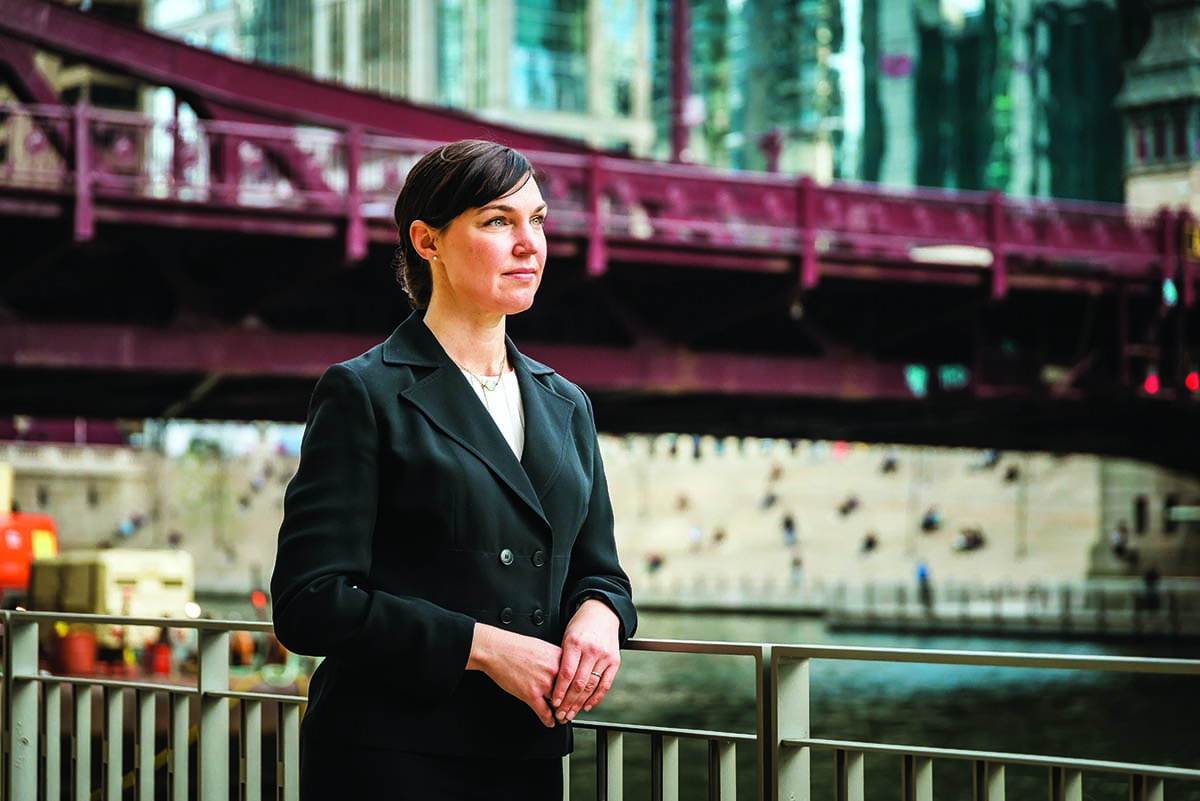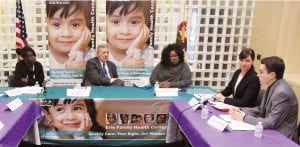Standing for Justice: Emily A. Benfer ’99

By Vicki-Ann Downing
Emily A. Benfer ’99, who majored in English at Providence College, spent a summer studying fiction writing at the Iowa Writers’ Workshop. Today, one of her favorite books is Horton Hears a Who!, Dr. Seuss’ story about an elephant with sensitive ears who hears the cries of a tiny civilization. She uses it as an example when teaching her students at Loyola University Chicago School of Law.
Lawyers need large ears, too, Benfer said. “We have a special responsibility. When we hear about injustice, we can’t fail to speak up. We must stand when others are inclined to sit,” she said.
Benfer, a clinical professor of law, is the founding director of the law school’s Health Justice Project, where she demonstrates exactly what advocacy means. In 2016, she led students on a mission to change an outdated federal lead paint regulation that was endangering children living in government-subsidized housing in Chicago and across the United States.
The Health Justice Project is “raising the next generation of socially-conscious attorneys and advocates” to help low-income people, single parents, children, and people experiencing disabilities, said Benfer. “We’re seeing the results in the community. We put law students in the driver’s seat and serve as their guide. It’s fulfilling to watch a student grow as both a professional and a person while improving another person’s life.”

Benfer’s path to advocacy began when she was a child growing up near Chicago. She learned about PC from a high school admissions counselor who knew she wanted to study outside the Midwest. On her first visit to campus, she was impressed by the sense of community. Friars Club members who led her tour were laughing and high-fiving each other.
“They were so excited about the school. They were having the time of their lives,” said Benfer. “Freshman year, I became a Friars Club member myself, so then I was the one who couldn’t help giving the high-fives. The College lived up to that every year that I was here, and there is the same sense of community today — a feeling of unity.”
Living in Providence furthered Benfer’s interest in travel. She spent her junior year at the University of Cambridge in England. After graduation, she entered the Peace Corps, volunteering for two years in Zimbabwe, Belize, and Thailand.
“I was looking to expand my understanding of the world,” said Benfer. “The service ethos at the College inspired me. One theme that continues to surface is the common humanity that runs through all of us. Providence College does a really beautiful job of instilling that in students. I encountered humanity in an international setting, in a way that surpasses language.”
Benfer returned from the Peace Corps inspired to become an international human rights lawyer. Her family had relocated to Connecticut, so while applying to law school, she worked as a paralegal and law clerk at the New Haven Legal Assistance Association. The nonprofit provides legal help to people who cannot afford it. She remembers a life-changing experience while working there.
“I met a caregiver, an elderly woman, blind, using a walker, caring for two children,” said Benfer. “The apartment smelled of mold, with peeling paint everywhere. I went to open a window to let in some fresh air, and the woman, who could barely walk, just about tackled me. ‘Don’t touch the windows! Do you see those holes?’ There were bullet holes in her window shades. ‘We will be target practice.’ This family was living in extreme poverty and horrific conditions, blocks from Yale University, arguably one of the richest institutions in the world. My focus shifted to poverty and health in the United States.”
Benfer entered Indiana University School of Law, graduating in 2005. After law school, she was awarded a prestigious Equal Justice Works legal fellowship and spent two years advocating on behalf of children and families through the Washington Legal Clinic for the Homeless in the District of Columbia. She also was a teaching fellow at the Georgetown University Law Center, where she earned a master of law degree and served as a legislative lawyer in the successful campaign to amend the Americans with Disabilities Act in 2008. Those hands-on experiences taught her that law could be a barrier when not equally applied.
“For many of the clients I’d been meeting in my legal career, I was getting there too late,” said Benfer. “I was reacting to injustice rather than preventing injustice from happening. While I was helping people who were homeless, I was realizing that I could have deferred their evictions, and the consequences, if I had met them earlier in the process.”
In June 2010, Loyola’s law school invited Benfer to join the faculty of the law and medical schools in launching the Health Justice Project. Benfer supervises law students, medical residents, and master’s degree candidates in public health, medicine, and social work as they collaborate to identify social and legal issues affecting patients at the Erie Family Health Center, a clinic serving 60,000 low-income patients in Chicago.
One issue arose in 2016 when the health center reported high lead levels in children as old as 10 living in government-funded housing. The families received federal vouchers to rent apartments, which did not undergo lead hazard inspection ahead of time.
“It’s very rare for a 10-year-old to develop lead poisoning at such high levels,” said Benfer. “One mother we represented told us she had been calling housing officials each time she received blood test results, asking if she could move to a new apartment. Each time, she was told that her children’s lead levels did not constitute an emergency that would warrant a move.”
It seemed impossible, but the housing officials were correct. The U.S. Department of Housing and Urban Development’s lead paint regulations for subsidized housing were based on standards set by the Centers for Disease Control in the 1990s. The HUD limits had never been updated, even as the CDC changed its recommendations. As a result, a child living in federally-assisted housing in Chicago, or in any of the 3.2 million similar households across America, would have to have lead levels four times higher than the CDC standard before intervention would be required.
“The families were forced to choose between lead poisoning and homelessness,” said Benfer. “The federal regulations set a child up for lifelong failure.”
From her experience in Washington, Benfer knew that lead poisoning is a disability under the Americans with Disabilities Act, and that the Administrative Procedure Act allows any citizen to petition a federal agency for rulemaking — the process agencies use to implement their regulations. The Health Justice Project, joined by a coalition of more than 30 scientists, medical providers, public health experts, nonprofits, and tenant groups, filed a petition for rulemaking with HUD, asking for amendments to the “Lead-Based Paint Poisoning Prevention in Certain Residential Structures” regulations.

Benfer also worked closely with U.S. Sen. Richard J. Durbin, D-Ill., and U.S. Sen. Robert Menendez, D-N.J., who sponsored the Lead-Safe Housing for Kids Act of 2016. The New York Times published an opinion article by Benfer in March 2016 headlined “Blame HUD for America’s Lead Epidemic.” Erie Family Health Center gave Benfer its 2016 Health Innovator Award, which she called “one of the most meaningful recognitions I’ve ever received. I revere them.”
At the National Lead Summit in December 2016, HUD Secretary Julián Castro announced that HUD would publish a rule aligning its regulations with CDC standards. He said the change would not have been possible without the advocates from Chicago.
“Students learned that a case doesn’t end because a law is unfavorable,” said Benfer. “In less than a year, they used their advocacy skills to effect change.”
The Health Justice Project now is responding to concerns about lead poisoning among 1,200 residents in a public housing complex in East Chicago, Ind., that was built on the site of a lead smelting plant. In 2009, the Environmental Protection Agency learned about high lead levels there, but residents weren’t informed until the summer of 2016, Benfer said.
Benfer married in 2008. Her husband, Dr. John McHugh, teaches health policy management at Columbia University. They have two children, Quinlan, 4, and Claire, 2.
“They make this work a lot more personal,” said Benfer. “Your child is my child. There couldn’t be a stronger motivation to make the world a better place.”
“I always come back to one client, one of the first I met during my internship in Washington after my first year in law school,” said Benfer. “She was a single mother with two kids, the ages my kids are now. The roof of her apartment literally caved in. She reported it to her landlord, and he responded by evicting her. It was clearly a retaliatory eviction, and illegal.
“I was helping an attorney on the case. I took the kids down the hall to get paper and crayons. The little girl drew me a picture of a rainbow. She whispered in my ear that I was her best friend. On the way back down the hallway she took my hand. And then, in a voice older than her years, she said, ‘Are you really going to help us?’ “Her voice and that rainbow and that little hand — the answer to that question always has to be ‘yes.’”





